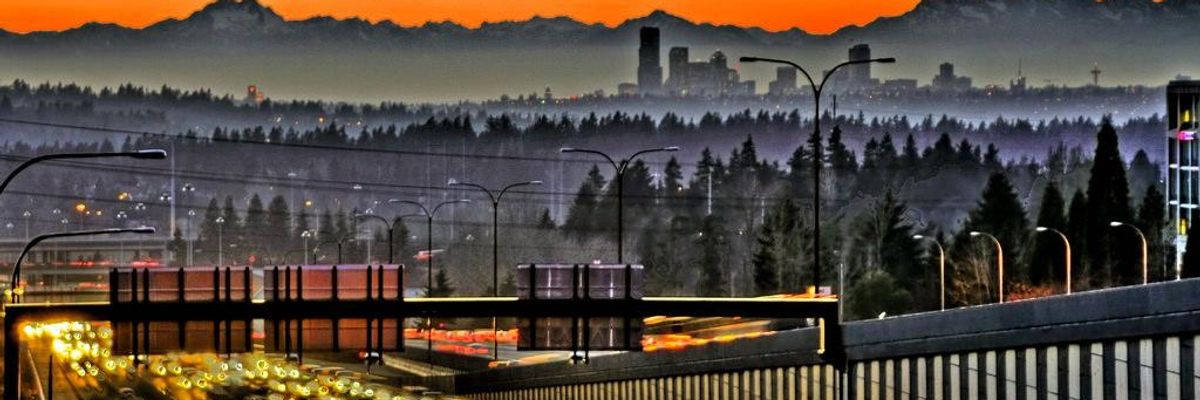The climate crisis is upon us. Year after year, we break records for heat, droughts and extreme weather. Super storms like Katrina and Sandy have devastated communities and left thousands homeless years later. Already we have our first climate refugees as rising seas swallow indigenous communities in Alaska and the Gulf. And hundreds of thousands of Americans die prematurely every year because of the deadly pollutants that go hand-in-hand with greenhouse gases.
We need smart solutions now. Zero-carbon energy sources? Yes. Clean mass transit? Definitely. Infrastructure that allows more of us to live car-free lifestyles? Unequivocally.
"I-732 - and revenue-neutral carbon taxes like it - only serves the most privileged among us and still falls far short of getting the job done."
But Washington state's Initiative 732 - a so-called "ambitious" carbon tax on the ballot next week won't deliver on any of these solutions.
I-732 is a supposedly "revenue neutral" carbon tax; it would charge $25 per ton of carbon dioxide and flush out the proceeds through a reduction in the sales tax, a rebate to low-income families and tax breaks to polluters. It will not spend a dime on solutions to climate change and it does nothing for the communities hardest hit by carbon pollution.
Its proponents contend that a price signal - that is, making fossil fuels more expensive - is all we need. To be sure, a high price on carbon is one of the most important tools we have in our climate action toolkit, but it won't get the whole job done by itself. Why? Because achieving deep, lasting carbon reductions that actually help the communities who are most at risk from carbon change will take more than relying on mere supply-and-demand.
Market forces put a premium on the most cost-effective reductions, but not necessarily the deepest. For example, a carbon price alone would stimulate demand for natural gas, which burns less carbon than coal and oil but still harms the climate and threatens our water and health. The market has no problem heaping toxins onto a low-income communities and communities of color if it generates profits.
What's worse, Washington State projects that these tax breaks could actually cost the state an additional $800 million over six years. If I-732 passes, we'd be forced to cut critical programs that serve low-income communities and communities of color who are already bearing the brunt of carbon pollution. The state is already facing tough cuts to programs like health care, child care and transportation while the state's supreme court actually fined the state $100,000 per day for criminally underfunding our school system.
We need to invest more in solutions that work, not cut taxes and shift money around. We desperately need to ditch coal, oil and natural gas and replace them with carbon-neutral alternatives if we are to mitigate the worst impacts of the climate crisis. The market alone won't get us there. Big energy companies will squeeze profits out of a dying energy source until there is nothing left. We need public investments in research, development, and proliferation of technologies that could allow us to leapfrog energy sources that are only marginally better than today's worst culprits.
A carbon price by itself cannot equitably deliver low-carbon--much less carbon-free--alternatives to those who do not wield adequate power in the market. And that's most of us. That's the glaring flaw in I-732. It favors business forces who want to look "green" without making the real, deep investments we need to make a dent. It puts politics ahead of policy, forgoing critical public investments in favor of revenue neutrality, rebates and tax breaks.
This is not an academic debate. Low-income communities and communities of color will continue to suffer if we pursue the wrong strategy. In Washington State, the transportation sector is the largest source of greenhouse gas emissions, and poses a serious public health threat to communities living along roadways with heavy traffic. Reducing our dependence on fossil fuel-powered transportation, therefore, is an essential piece of effective climate policy locally and integral to achieving health equity.
Proponents of Initiative 732 would have you believe that merely by making gas more expensive, we can reduce transportation emissions, but research by the U.S. Congressional Budget Office, the U.S. Energy Information Administration, California's Air Resources Board, and many others disputes that claim. They find that the correlation between gas prices and vehicle miles traveled is very weak, especially for low-income folks; most people already drive as little as they have to, and increasing gas prices won't get them out of their cars unless they can get into something else.
So what are our best tools for reducing this source of carbon pollution? Clean, frequent transit, smarter land use decisions, and a way to make it all affordable so that everyone can live closer to where they work, learn, and play.
These solutions aren't just solutions to climate change; they're climate justice solutions. They are as imperative to reducing greenhouse gases and their deadly pollutants that come with them as they are to promoting racial and social justice. And this is what proponents of I-732 don't understand. You can't solve this crisis by excluding the communities on the frontlines. I-732 - and revenue-neutral carbon taxes like it - only serves the most privileged among us and still falls far short of getting the job done.
And let's be realistic; not using a tool like public investment now is the same, politically, as tossing it out the window forever. Once we have a price on carbon, the prospect of raising additional revenue to invest in these solutions will grow very dim. We have to get this right the first time, and we can only do it by growing a movement that belongs to everyone.
